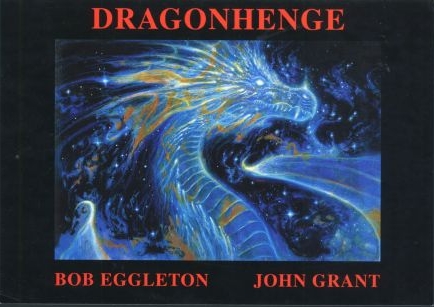 |
|
Bob Eggleton's postcard for his latest venture. These are some pretty spectacular looking dragons. Eggleton's image graces the new Golden Gryphon novella by Alastair Reynolds. See the previous column/Con Report for an image.... |
|
|
|
The Agony Column for September 11, 2002
Commentary by Rick Kleffel
Today the column returns to its usual schedule. I'm aiming for twice a week, and will be happy to get it. I hope to get new reviews up daily. I'm settling in to a new book-oriented task interviewing authors for a local NPR affiliate, KUSP. The first interview, with Alastair Reynolds, aired on Monday. On Monday, I recorded an interview with Timothy Ferris. I'll be interviewing more authors as time goes by, and I'll keep readers informed. The interviews will usually be webcast and available as a RealAudio archive both on this site and from the radio station, KUSP. WorldCon was quite a whirl, but I hope to get the next series of reports up much faster. I met lots of interesting people, and authors worth reading. To me, all of this is Fun With A Purpose.
By the time I got to WorldCon, Day 2, I'd missed Alastair Reynolds' reading. Early that morning -- 6 AM early -- it had dawned on me that the following day, I'd be performing music in the art gallery, and I wanted more material for the show. To this end, I turned on the machines, put on my headphones and plunged into the depths of my 20-year old gear to get some sequences recorded. I had the usual morning interruptions -- taking one son to school, getting the house going for the day. Then I went back into the studio and composed until it was time to take the other son to school and myself to the con. I'd left late enough that it was an easy drive over the hills.
 |
|
Bob Eggleton's postcard for his latest venture. These are some pretty spectacular looking dragons. Eggleton's image graces the new Golden Gryphon novella by Alastair Reynolds. See the previous column/Con Report for an image.... |
Having missed the beginning of the reading, I decided to take another spin through the dealer's room. The guy at the $cientology-owned 'Writers of the Future' booth looked lonely. Otherwise it was bustle and spend. I refrained from spending other than picking up the Reynolds novella for a buddy. While I was there, staring at the heap of cut-board covers they had, featuring the very nice work of Bob Eggleton, the artist himself showed up and happily signed two boards. He also handed me a postcard for his new venture, 'Dragonhenge'. The detail is pretty amazing.
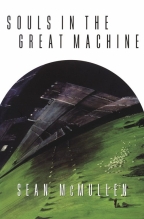 |
|
I had alrteady purchased all three Sean McMullen novels before I heard him read. I haven't got round to reading them yet, alas.... |
Wandering about in the main concourse, I came up Alastair Reynolds (he insisted I call him Al, and henceforth, I shall). He was vacating his reading, but the writer arriving was of interest to us both -- Sean McMullen, Australian author of the 'Greatwinter' trilogy, a series of books that have the great advantage of being actually finished. I have them all on my shelf and fully intend to read them -- more so, now that I've heard him read. 'Souls in the Great Machine', the first novel is currently on loan to Jan. Al was interested, as was I, and we ended up hearing Sean read. I was glad I'd spent the money on the books. To my mind, they had an appeal similar to that of Steve Erikson or China Mieville. Dark, complicated science fantasy that harkened back to Jack Vance and Roger Zelazny. It probably helped that he was a good reader of his own work.
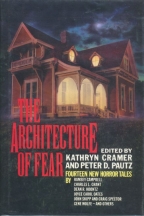 |
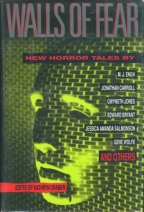 |
|
Bak in the day, I read a lot of anthologies, and this was where I first encountered Gene Wolfe. |
As it happened, Kathryn Cramer was a panel guest at the Convention. Alas, I did not get a chance to hear her speak. |
For one PM I was torn between a panel on 'Disposable Skiffy -- Does SF Have A Sell By Date?' featuring David Hartwell, Gardner Dozois, Charles Brown and Gordon Van Gelder and 'Making Characters Live in Their Worlds', with Gene Wolfe, Pat Cadigan, Tim Powers and Michelle Sagara West. Then there was 'Pitching the Novel: Tips for In-Person Contact', with Ginjer Buchanan, Carol Berg, Ashley Grayson, and Eleanor Wood. I opted for the last, and left Al in the Gene Wolf deal. I'd spoken to Ginjer briefly after missing Al's reading. I found her inspiring, and inspiration being in short supply, I thought I'd attend her panel. Alas, by the time I got there, attendees were flowing out the door. Not wanting to share the sardine experience, I opted for Fun With A Purpose -- Gene Wolfe's panel. As my readers might suspect, I'm a Tim Powers fan, and frankly he was the big draw for me. I've suspected that I would like Gene Wolfe. He's held in high regard by John Clute, and Clute's reviews of Wolfe's stuff have made his work seem intriguing. Alas, it's usually part of some series, of which I haven't read the first books -- 'The Urth of the New Sun'. I actually just bought an omnibus edition of the first four novels, and look forward to them. Come to think of it, I have read at least two stories by Wolfe, in the Kathryn Cramer/Peter Pautz anthology 'The Architecture of Fear' and Kathryn Cramer's 'Wallsa of Fear'. But the upshot of it is, I'm woefully unfamiliar with one of the top writers at this convention. That's why you go to the convention, no?
I arrived a bit late, but found that only Gene Wolf and Michelle Sagara West had showed up -- or were going to show up. Tim Powers hadn't made it, and I'd already seen on an updated list that Pat Cadigan wasn't there either. So, after a few minutes of pass the microphone, Wolfe took the moderator chair and went to work. After a couple of thoughtful monologues on the panel topic, the writers opened themselves up for questions and proceeded to spend the next hour and a half dispensing very useful tips for writers. I don't recall ever seeing a book by Ms. West, who apparently has a lengthy series out. If I had the time, I think I would seek her fiction out based on her advice, which was clear-headed, well-delivered and relatively entertaining. Wolfe gave excellent advice and thankfully was willing to go fairly far off-topic to tell some very amusing anecdotes. Afterwards, as we walked out, Al headed off to join his partner, and I found myself standing next to Wolfe. We talked for a couple of minutes, and then both ran for the next panel.
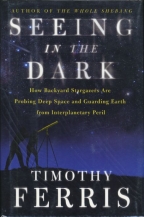 |
|
I was reading this book while attending the convention. It caused a bit of cognative dissonance and resonance. I was also itching to tell people about it. Alas, no chance this time. |
I was interested in three panels. Tor had an upcoming attractions panel, and I was interested to see if they were going to tell us about Neal Asher. There was also a panel on 'Astronomy as a Hobby When You Have a Day Job'. I was smack in the middle of Timothy Ferris' new book 'Seeing in the Dark: How Backyard Stargazers Are Probing Deep Space and Guarding Earth from Interplanetary Peril'. This book is absolutely tailor-made to mention at this panel, and a hell of a good read besides. However, I'm not yet an amateur astronomer. Finally there was 'The Future of Science Fiction as a Literary Form'. Cheryl Morgan, Andrew Burt, Stanley Schmidt, Peter Nicholls and Andrew Wheeler were the panel names here, Schmidt familiar from his editorship at Analog, and Nicholls from somewhere I could not remember.
I opted in a sense for all three. I wheeled by the Tor presentation, which was incredibly slick -- slides, three mics (most panels only had one), three presenters who knew exactly what they were going to say. As interesting as it was for me, I decided it was something I could get from Locus, to which I now (for some reason) subscribe.
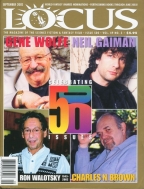 |
|
I susbscribe to Locus, look, with Gene Wolfe and publisher Charles Brown and Neil Gaiman (all who attended the con) on the cover. But I'm sort of afraid to read it. |
[I say 'for some reason', because, although it is an excellent magazine, and although it is filled with lots of information I can use, that information consists largely of reviews that I'm disinclined to read because I want to read the books in question and because I want to form my own opinion upon doing so. So a large part of this magazine is barely glanced at, as fine as it is.]
So, I wandered over to the astronomy panel, hoping I could briefly find a time when I could mention the Timothy Ferris books without seeming a boor. That proved impossible, and after a few minutes of panel members giving excellent advice on a subject I was currently reading an enjoyable book upon, I moved to 'The Future of Science Fiction as a Literary Form'.
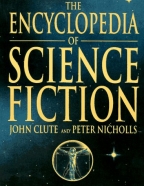 |
|
Peter Nicholls was on the panel for 'The Future of Science Fiction as a Literary Form'. |
Here was a panel I was frankly hoping would be more interactive than it actually proved to be. To my mind, Cheryl Morgan and Peter Nicholls were the most in tune with my thoughts on the matter. But overall, I thought the panel took an interesting though unfortunate turn. There seemed to be little if any discussion of the literary aspect of science fiction. Forms, literary techniques and literary inventions were pretty much left aside. Instead, the talk seemed to revolve around new sub-genres that would emerge as dominant in the coming years. To me this seemed a very ingrown vision of science fiction, and emblematic of why science fiction is often dismissed as a form of literature. On the other hand, I couldn't claim to actually actively disagree with either Nicholls or Morgan. The hypertext as novel idea sounds good, but I'm like a linear novel, plain and simple. So far. And even Kim Newman's effort has left me perplexed enough to leave it on the shelf, though I certainly bought it fast enough.
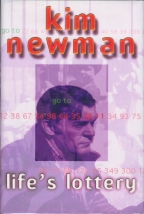 |
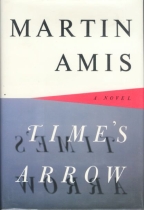 |
|
'Life's Lottery' is Kim Newman's hypertext novel. Though the format is unusual, the story is simply the tale of a modern Everyman. |
'Time's Arrow' is an excellent literary venture into science fiction and suggests new ways for science fiction to remain a distinct genre but evolve in a literary fashion. |
Sure, it's obvious that much of what passes for mainstream fiction now incorporates elements of what used to be strictly science fiction. So when everything is science fiction, how does the genre survive as a genre, and should it survive as a genre? This yielded some interesting discussion, but again, it evaded to me the more interesting point. Hypertext fiction was swiftly dismissed, and only the Cheryl Morgan got round to mentioning Kim Newman's experiment in this genre, 'Life's Lottery'.
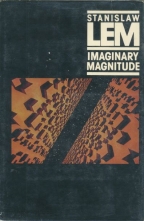 |
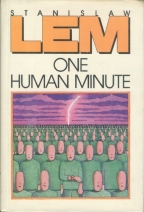 |
|
I read a lot of Stanislaw Lem back in the 1980's when these came out. They still seem to me to be revolutionary science fiction, and suggest one of the new forms that we may see a lot of in future virtual bookstores. |
'One Human Minute' is Lem's vision of an alternate Guiness Book. Prepare to get a lot of Lem hype as the second movie version of 'Solaris' comes out in a couple of months. A number of Lem's stories seem tailor-made for film. |
I did manage to bring up Lem's literary experiments in science fiction, and Martin Amis' 'Time's Arrow' as some interesting directions of science fiction. But the discussion was once again overwhelmed about how soon we'd all be reading well, bio-punk as opposed to cyberpunk. Still, the discussion was certainly intellectually stimulating, even if it only confirmed some of the problems with any meeting of genre-related people.
How I missed Kevin Anderson and Rebecca J. Moesta's panel that followed 'Things I Wish Some Pro Had Told Me When I Was Just Starting Out', I'll never know. I can put it down to the excitement of the convention, or more appropriately, my nervousness at the upcoming musical performance. I still wanted to generate more material for the art show performance on the morrow. I wandered through the Dealer's room again, but got out with all my money or to me more precise, without spending more money I didn't have.
Though it was 4 PM, and the traffic going home promised to be fierce, and there were the numerous Friday night parties, I still tromped out to the car and headed home. I'm not much of a night or party person, and anyway, I knew I'd be fretting about the music. I got on the 280 headed south with incredible ease. Thank you Convention planners for those fabulous freeway directions. They matter, they matter! Traffic was relatively, surprisingly light, until I swung out onto the overpass from the 280 to the 880. There, in two lanes of traffic, I came to a grinding halt, though I could see that the traffic cleared up not far ahead. Sitting there, about a hundred feet off the ground on a tiny ribbon of concrete, I felt an enormous crash as the car behind me slammed into my rear bumper. I was completely unprepared for this. I could feel my spine ripple like a wet noodle, and maybe that's why I'm not wearing a neck brace today. Fortunately for the traffic behind us, there was a pull-over lane. Fortunately for me, the car that hit me was a new-model Mercedes, driven by a woman doctor who had been on duty since 5 AM. It was now about 12 hours later, and she was mightily sorry. I was fuming mad, thinking it would now take me hours to get home and I'd have no time to compose more music. Ten minutes later I was on my way; 45 minutes later I was home. Traffic is funny that way. No excuses for not doing the music. And so I did, sitting cocooned in my machinery late into the night.
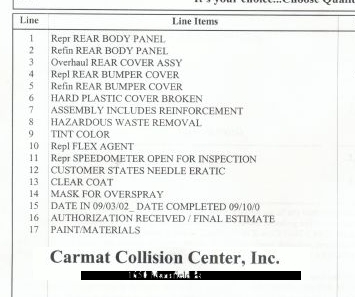 |
|
I'll leave the costs associated with all this car repair as an exercise for the reader. |
Thanks,
Rick Kleffel